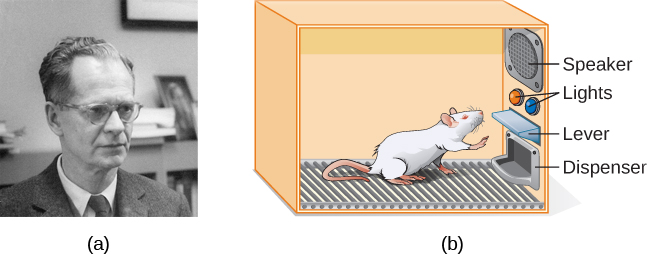| << Chapter < Page | Chapter >> Page > |
B. F. Skinner (1904–1990) was an American psychologist ( [link] ). Like Watson, Skinner was a behaviorist, and he concentrated on how behavior was affected by its consequences. Therefore, Skinner spoke of reinforcement and punishment as major factors in driving behavior. As a part of his research, Skinner developed a chamber that allowed the careful study of the principles of modifying behavior through reinforcement and punishment. This device, known as an operant conditioning chamber (or more familiarly, a Skinner box), has remained a crucial resource for researchers studying behavior (Thorne&Henley, 2005).

The Skinner box is a chamber that isolates the subject from the external environment and has a behavior indicator such as a lever or a button. When the animal pushes the button or lever, the box is able to deliver a positive reinforcement of the behavior (such as food) or a punishment (such as a noise) or a token conditioner (such as a light) that is correlated with either the positive reinforcement or punishment.
Skinner’s focus on positive and negative reinforcement of learned behaviors had a lasting influence in psychology that has waned somewhat since the growth of research in cognitive psychology. Despite this, conditioned learning is still used in human behavioral modification. Skinner’s two widely read and controversial popular science books about the value of operant conditioning for creating happier lives remain as thought-provoking arguments for his approach (Greengrass, 2004).
During the early 20th century, American psychology was dominated by behaviorism and psychoanalysis. However, some psychologists were uncomfortable with what they viewed as limited perspectives being so influential to the field. They objected to the pessimism and determinism (all actions driven by the unconscious) of Freud. They also disliked the reductionism, or simplifying nature, of behaviorism. Behaviorism is also deterministic at its core, because it sees human behavior as entirely determined by a combination of genetics and environment. Some psychologists began to form their own ideas that emphasized personal control, intentionality, and a true predisposition for “good” as important for our self-concept and our behavior. Thus, humanism emerged. Humanism is a perspective within psychology that emphasizes the potential for good that is innate to all humans. Two of the most well-known proponents of humanistic psychology are Abraham Maslow and Carl Rogers (O’Hara, n.d.).
Abraham Maslow (1908–1970) was an American psychologist who is best known for proposing a hierarchy of human needs in motivating behavior ( [link] ). Although this concept will be discussed in more detail in a later chapter, a brief overview will be provided here. Maslow asserted that so long as basic needs necessary for survival were met (e.g., food, water, shelter), higher-level needs (e.g., social needs) would begin to motivate behavior. According to Maslow, the highest-level needs relate to self-actualization, a process by which we achieve our full potential. Obviously, the focus on the positive aspects of human nature that are characteristic of the humanistic perspective is evident (Thorne&Henley, 2005). Humanistic psychologists rejected, on principle, the research approach based on reductionist experimentation in the tradition of the physical and biological sciences, because it missed the “whole” human being. Beginning with Maslow and Rogers, there was an insistence on a humanistic research program. This program has been largely qualitative (not measurement-based), but there exist a number of quantitative research strains within humanistic psychology, including research on happiness, self-concept, meditation, and the outcomes of humanistic psychotherapy (Friedman, 2008).

Notification Switch
Would you like to follow the 'Psychology' conversation and receive update notifications?